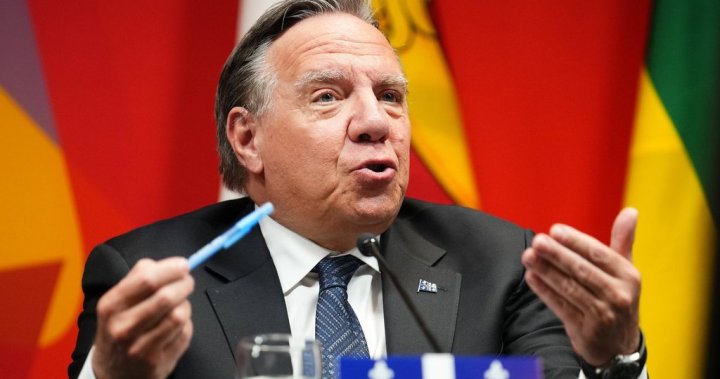Quebec’s Retaliation Against US Tariffs
In response to the impending tariffs on Canadian goods announced by US President Donald Trump, the province of Quebec has initiated a series of retaliatory measures. Premier François Legault convened meetings with key figures in the province’s financial sector, including CEOs of major banks and heads of the provincial pension fund manager, investment arm, and electric utility. This strategic consultation signals a concerted effort to mitigate the potential economic fallout from the US tariffs.
Quebec’s Economy Minister, Christine Fréchette, articulated the province’s planned countermeasures, which include a 25% penalty on bids from American companies vying for Quebec government contracts. This mirrors the 25% tariff the US intends to levy on most Canadian goods. Fréchette asserted that this penalty would effectively render American bids non-competitive, significantly hindering their chances of securing government contracts within the province.
Furthermore, the province’s liquor board will cease the sale of American products, extending this ban to bars and restaurants within Quebec. This action represents a direct targeting of American goods within the provincial market and underscores the seriousness of Quebec’s response to the trade dispute.
Montreal’s mayor has echoed the provincial government’s stance, confirming the city’s preparation of its own counter-tariff measures. Among the considered responses is a similar 25% penalty on American suppliers bidding for municipal contracts. This coordinated action between the provincial and municipal levels of government demonstrates a unified front against the US tariffs.
Quebec’s comprehensive response, encompassing both government contracts and consumer goods, signifies a determined effort to protect its economic interests and exert pressure on the US administration. The province’s targeted actions aim to inflict reciprocal economic consequences on American businesses while sending a strong message of defiance against what it perceives as unfair trade practices.
The Broader Context of the US-Canada Trade Dispute
The imposition of tariffs by the US on Canadian goods sparked a significant trade dispute between the two North American neighbors. The tariffs, covering a wide range of Canadian products, were met with strong condemnation from the Canadian government and industry representatives alike. The Canadian government vowed to retaliate with countermeasures of its own, setting the stage for an escalating trade war.
Quebec’s response exemplifies the broader Canadian reaction, demonstrating a resolute stance against perceived protectionist measures by the US. The targeted nature of Quebec’s actions reflects a strategic approach, aiming to maximize the impact on American businesses while minimizing the negative repercussions on the Quebec economy. The province’s focus on government contracts and the liquor market highlights key areas where American businesses have a significant presence and where retaliatory measures can exert considerable pressure.
The trade dispute between the US and Canada underlines ongoing tensions surrounding trade policies and economic relations between the two countries. The dispute also raises concerns about the broader implications for North American trade and the potential for long-term economic repercussions on both sides of the border.
Political Implications and the Path Forward
The trade dispute carries significant political implications for both the US and Canada. Within Canada, the tariffs have galvanized public opinion against the US administration’s trade policies, hardening stances and increasing calls for retaliatory measures. The unified response from various levels of government in Canada, as exemplified by Quebec’s actions, demonstrates the political will to oppose the US tariffs.
In the US, the tariffs have been met with mixed reactions, with some sectors expressing support while others raise concerns about the potential for negative economic consequences. The escalating trade tensions could complicate political relations between the two countries and hinder future negotiations on trade and other bilateral issues.
The path forward remains uncertain, with both sides seemingly entrenched in their positions. The possibility of further escalation remains a real concern, with the potential for a protracted trade war that could inflict significant economic damage on both countries. The need for dialogue and negotiation to resolve the trade dispute is paramount, with a focus on finding mutually acceptable solutions that address the concerns of both sides.
The Importance of Trade Relations between the US and Canada
The US and Canada share a long history of close economic ties, with significant trade flows between the two countries. The two economies are deeply integrated, with numerous industries relying on cross-border trade. The trade dispute threatens to disrupt these established economic linkages and inflict economic harm on both sides.
The free flow of goods and services between the US and Canada has been a cornerstone of economic prosperity for both nations. The trade dispute underscores the importance of maintaining strong and stable trade relations between the two countries, recognizing the mutual benefits of open and predictable trade policies.
Quebec’s Role in the Canadian Economy
Quebec plays a significant role in the Canadian economy, representing a major industrial and commercial hub. The province’s diverse economy, including manufacturing, aerospace, natural resources, and tourism, contributes significantly to Canada’s overall economic output. Quebec’s response to the US tariffs carries weight within the broader Canadian context, reflecting the province’s economic importance and its determination to protect its interests.
The coordinated approach between the provincial and municipal governments in Quebec further emphasizes the province’s influence and its ability to mobilize resources in response to external economic pressures. Quebec’s actions serve as a model for other provinces and municipalities across Canada, demonstrating the potential for unified action in defense of economic interests.
Update on the US Tariff Situation
In a subsequent development, Canadian Prime Minister Justin Trudeau announced a 30-day pause on the US tariffs on Canadian goods. This development signals a potential de-escalation of the trade dispute and offers a window of opportunity for negotiations to find a resolution. While the pause provides temporary relief, the underlying issues remain, underscoring the need for continued dialogue and a concerted effort to reach a long-term agreement that addresses the concerns of both countries.

